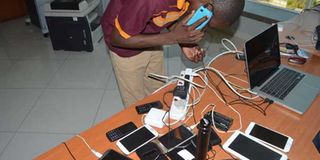Talking to machines makes me feel like an idiot, I wonder if I’ll ever get used it

A Mombasa resident makes calls at a phone charging point on March 19, 2016. PHOTO | KEVIN ODIT | NATION MEDIA GROUP
What you need to know:
- Courtesy of US President Donald Trump, there is much chat nowadays of “fake news.”
- I telephoned the relevant Council department, known as Envirocall, to arrange a replacement.
They are getting worried about automation in Scotland after a report warned that nearly half of all jobs there could be carried out by machines in just over ten years’ time.
The report said: “The world of work in 2030 will be very different to that of 2017. People are more likely to be working longer and will often have multiple jobs.”
If they have jobs at all, I suppose.
I got a taste of what the 2030 world might be like just last week.
Let me explain that garbage bins here come with a tidy or caddy to keep glass objects separate from the rest of the rubbish.
Ours was stolen, so I telephoned the relevant Council department, known as Envirocall, to arrange a replacement.
AUTOMATIC VOICE
This is how it went:
Automatic voice: Welcome to the city council. Please say the name of the person or department you wish to speak to.
Me: Envirocall.
AV: Please listen carefully to the following options. For bins and waste, say bins. For parks and gardens, say parks. For street lighting, say street. For tipping sites, say tipping. For garden waste, say garden. For anything else, say other.
Me: Bins.
AV: Please listen carefully to the following options: For missed collections, say missed. For date of collection, say date. For replacement bins, say replace. For public bins, say public. For anything else, say other.
Me: Other.
AV: We will now transfer you to one of our assistants. (Pause). All our service workers are presently occupied, there will be a wait of 12 minutes.
Music during the wait is punctuated by frequent reminders that I can do all this online, and, implicitly, save everybody a lot of trouble by doing so!
After six minutes, hurrah, a real person! The problem of the missing tidy is explained and a new one is promised on the next collection day.
The whole performance took about fifteen minutes and I got what I wanted, so why did I feel like a total idiot when I hung up? Because I had been spending a chunk of my life talking to a machine!
***
Courtesy of President Trump, there is much chat nowadays of “fake news,” and for a moment I wondered about a report which said Britons are falling out of love with booze.
But the figures come from the unimpeachable Office of National Statistics and they look convincing.
When 8,000 Britons were asked if they had an alcoholic drink in the past week, some 40 per cent said no.
This was the highest rate since surveys began in 2005.
ALCOHOL CONSUMPTION
It’s well known that people underestimate their alcohol consumption, but the Beer and Pub Association supplied confirmation of the trend.
In the early 1950s, alcohol consumption per head was some four litres per year, about 140 pints of beer.
This figure climbed steadily over the years, peaking at 9.5 litres in 2004.
Today, however it has fallen back and is under eight litres.
SOCIALISE ONLINE
Various reasons have been put forward, including the recession, the trend for young people to socialise online rather than in the pub, more moderate wine-drinking habits acquired on foreign holidays, and immigration, with drinking rates lower in areas of ethnic diversity.
***
The blue badge on the lady’s coat said: “Please offer me a seat.” At least three younger people in the crowded carriage spotted the appeal and leapt to their feet.
As a mzee with white hair, I find young people are good about that sort of thing, but naturally, some don’t notice.
London Transport, which runs the tube system and the red buses, introduced the badge scheme to help people who need assistance but look OK.
MULTIPLE SCLEROSIS
Not all illnesses or impairments are visible to other passengers so the badges allow the wearer to avoid explaining their condition to someone in the hope of getting a seat.
Tasha Proctor was one of the first to try out the system. She is 26 and has multiple sclerosis.
On buses and underground trains, she can feel dizzy and nauseous and needs to sit down. She said: “Often more than one person stands up at the same time to offer me a seat when they see my badge.”
The scheme is voluntary and nobody is asked for their medical records. If you apply for a badge, you get one, free.
***
The following are quotes from British military staff appraisals, but can be applied to civilians:
He would be out of his depth in a car park puddle.
Since my last report, he has reached rock bottom and started to dig.
This officer should go far and the sooner he starts the better.
Has two brains; one is lost and the other is out looking for it.
He is so dense, light bends around him.





